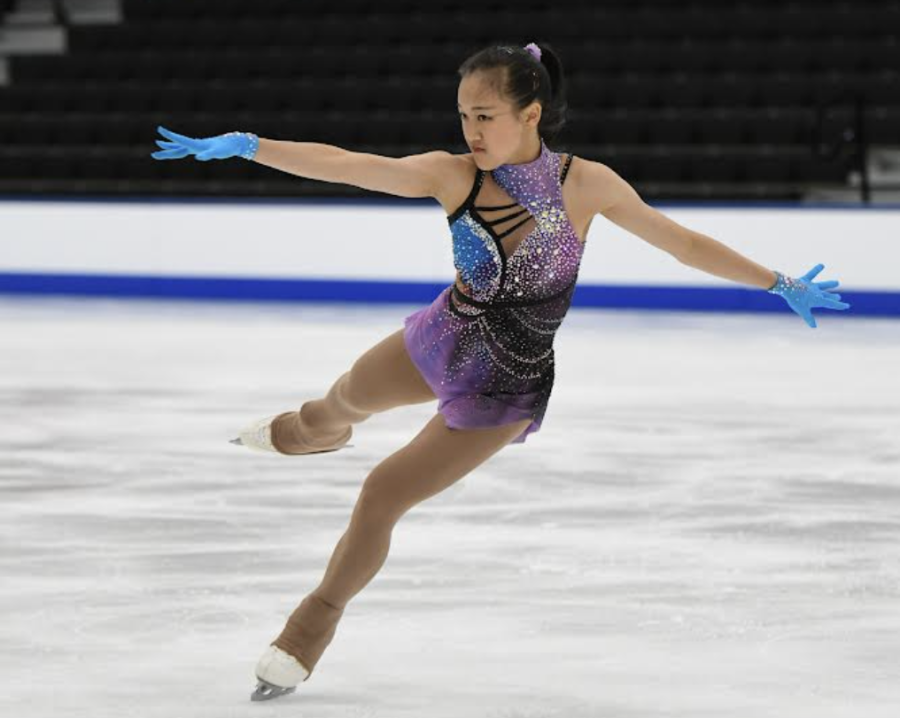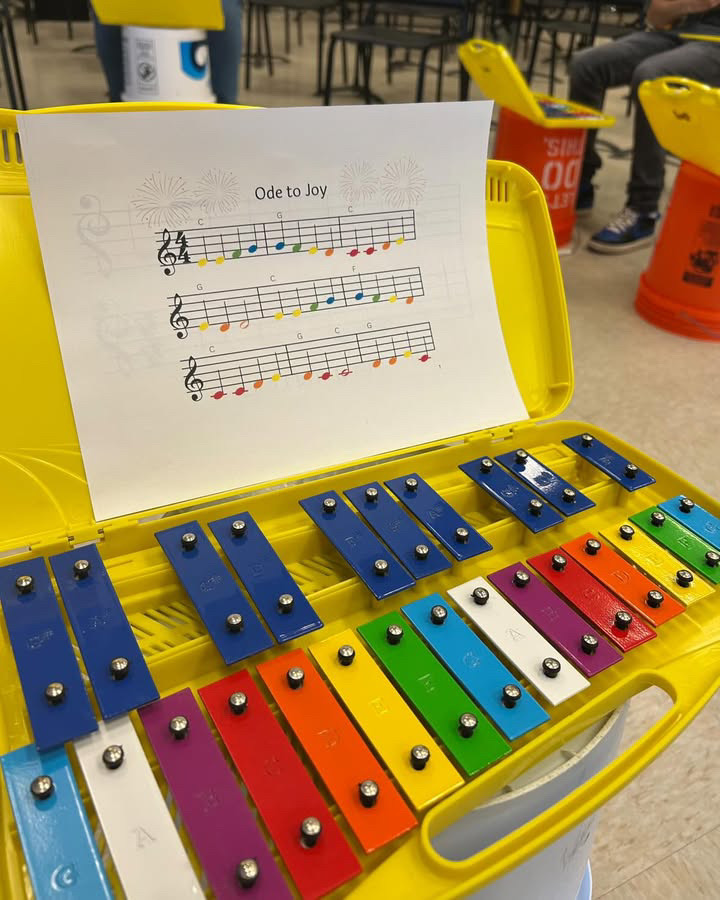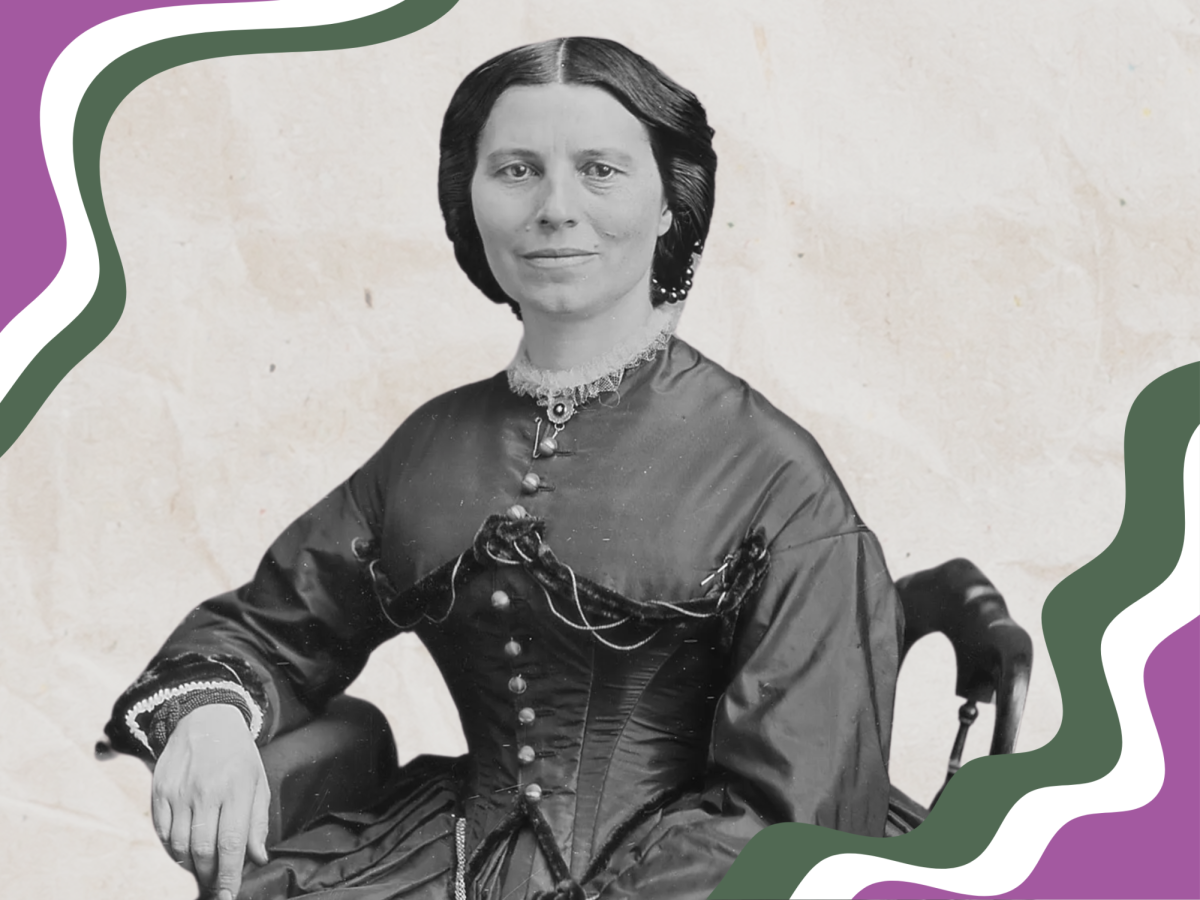Vera Zhong jumps ahead of the competition
Senior Vera Zhong fell in love with figure skating from the moment her blade met the ice, and she’s since competed in local, regional, national and even international competitions.
March 30, 2022
Senior Vera Zhong gains speed as she glides over slick white ice. With a glance over her left shoulder, she brings her arms together and transfers her weight from the blade to the toe pick of her skates to kick off. As she flies through the air, her body assumes “seatbelt position” — during which a skater tightly crosses their arms over their torso and fully extends their legs — where she remains for two-and-a-half rotations before her toe pick comes back into contact with the ice. While the skill only lasts a few quick seconds, the meticulous steps required to complete it reflect the precision necessary to land this notoriously difficult ice skating skill: the double axel.
Zhong has been a figure skater for the past 11 years. She fell in love with the sport from the moment her blade met the ice at age six, and since then, she’s competed in local, regional, national and even international competitions. Despite injuries and setbacks, something about skating has “always felt right” for Zhong, she said.
“When I was younger, I thought it was fun to skate around and jump,” Zhong said. “I still love the feeling of jumping, skating and spinning, but overall the nice thing is having something to work towards and improve on.”
After Zhong attended Burning Tree Elementary School’s annual skate night in first grade, her parents decided to sign her up for skating lessons at Cabin John Ice Rink, because she enjoyed it so much. There, she participated in group lessons taught by skating coach Nancy Lussi, who would go on to become Zhong’s individual coach for the next five years.
“I remember getting my first pair of skates,” Zhong said. “I was so excited and thought it was the coolest thing.”
After beginning to attend competitions, Zhong noticed that a few of the distinctly talented skaters at the rink trained with the same coach, Andrey Kryukov. Ready to take her skating to the next level, Zhong asked her parents if she could also begin training under Kryukov.
“This was kind of the turning point in her skating journey,” said Josephine Chen, Zhong’s mother. “This coach was actually in Ashburn, Virgina, so Vera and I sat down and had a conversation about if she and I were ready to make this commitment.”
The commitment wasn’t light.
As a freshman, Zhong would wake up at 4:30 in the morning, leave the house by 4:50, get on the ice by 5:40, train for an hour and a half and then drive back to Maryland to get to school by 7:45. When the timing was tight, sometimes she was forced to work on homework during her ride to and from the rink, Zhong said, but over the years, she’s been able to craft a manageable routine. Now, as a senior, Zhong leaves school early to train — having enrolled in a reduced course load — and spends multiple hours at the rink every afternoon. At times, this commitment has been stressful for both Zhong and Chen, but Zhong’s passion for skating has motivated the two to maintain her demanding schedule.
“If your kid has a dream, you always want to support them,” Chen said. “We decided if you really like it, we will help you.”
The intensity of Zhong’s training changes depending on her competition preparation. In the time leading up to a competition, Zhong practices about six days a week, with each practice lasting around two hours. Otherwise, Zhong practices around three days a week. Her practices vary in focus; some consist of only conditioning and off-ice jumps — imitating the rotations of an ice jump on regular ground — while other practices focus on learning a specific routine.
“She’s very driven, she’s very determined and she’s a perfectionist,” Kryukov said. “She understands that in order to compete at a certain level, she has to spend a lot of time on jumps and spins to make them look presentable.”
Zhong’s coaches have always been very supportive, she said, but they do expect her to constantly show up and put in maximum effort, which can become tiring. Although balancing skating and school has been difficult, for Zhong, managing that delicate balance has, over the years, simply become routine.
“There’ve been times when I had to miss a friend’s birthday party for practice,” Zhong said. “But when you enjoy doing something, you’ll pretty much do anything to make sure that you’re able to continue doing it.”
A skating competition consists of two performances: the long program, which lasts for around four minutes, and the short program, which lasts for around three minutes. Before a competition, Zhong works with her choreographer and coach to choose the music and skills for her program. Music choice is especially influential in determining the timing of the skills, the tone of the performance — whether somber or upbeat — and even the design of the dress the skater will wear. It’s common in the skating world to reuse music, so Zhong often looks to her favorite skaters like Yuzuru Hanyu and Alexandra Trusova for musical inspiration. Zhong is currently training for a performance that features music from “The Phantom of the Opera,” but she’s performed to a variety of music — including classical, pop and movie soundtracks.
“Within the past ten years, the rules have changed, because before you weren’t allowed to skate to music with lyrics, but now you can skate to pretty much anything,” Zhong said. “It’s really fun skating to lyrics, and sometimes you can skate to really elegant or graceful music for one program and then to a crazy pop song for the next one.”
There are several types of competitions for female skaters at various levels. In regional competitions, Zhong competes in the Southatlantic region, which spans from Pennsylvania down to Florida. Two years ago, Zhong competed in regionals in Philadelphia, placing second overall, and then traveled to compete at sectionals in Hyannis, Massachusetts, placing sixth overall. Last summer, Zhong competed in her first international competition in Boston, Massachusetts, and most recently, she competed in her second international competition, in Gdansk, Poland.
“It was very exciting to travel abroad, because when you go to these competitions you can see so many skaters that you would never usually compete with locally,” Zhong said. “I’d never been to Poland before, so it was a really awesome experience.”
Zhong says that some of the skaters she competed against in Poland train approximately seven hours a day. Although Zhong takes skating seriously, she prioritizes school first, along with a healthy balance in her social life.
“It was definitely a really interesting experience for me, because a lot of the skaters from other countries are a lot more intense; their life revolves around skating,” Zhong said.
Even when up against fierce competition, Zhong feels supported by her mother and coach who travel alongside her to competitions, she said. Chen has appreciated the opportunity to watch her daughter improve and mature as a skater over the years.
“What I really love about her competitions is that every time before she goes on the ice, she gives me a really tight hug,” Chen said. “That makes me feel really good, and like I have made a difference.”
Zhong’s support system isn’t limited to her mother and coach: Her fan base also includes other skaters from years of practicing together. Maya Zamcho, a sophomore at Independence High School, is a lifelong friend that Zhong made through skating. At competitions, Zamcho and Zhong take turns cheering each other on from the stands. It’s always helpful to have someone who compliments you on the little details that most non-skaters can’t pick up on, Zamcho said.
“It’s nice to have a senior skater so I can ask her for help on jumps and spins,” she said. “She’s someone that I can look up to.”
For Zhong, a new performance number — along with a new choreography — means a new dress. It’s common for Zhong to work with a designer to create a dress from scratch, but she also looks online for dresses that fit her body type and compliment the performance. When she collaborates with a designer, Zhong decides on the colors, the cut of the dress and whether or not to include gems, sleeves and gloves. Then, the designer sends her sketches of the dress before it’s sewn.
“Based on their design sketches, you can say ‘I like this one,’ or ‘I like this, but I want to change something here,’” Zhong said. “You can go back and forth until you have a design that is perfect, and then they make it and ship it.”
After a competition, Zhong typically takes time off from skating to allow her body to recover before she begins training for her next performance. Figure skating often takes a physical toll on skaters as a result of the constant jumping, landing and arching the sport requires.
In her 11-year skating career, Zhong has endured numerous injuries ranging from stress fractures to concussions to chronic bone bruises on her vertebrae — these bruises have been the worst injuries she’s experienced, Zhong said. Taking time off the ice to fully recover from her injuries is challenging, because it’s possible to lose the progress that she worked so hard for, she said.
“I didn’t skate for a long time due to my injuries, so I’ve had to build my way back up to my hardest skills,” Zhong said. “It’s easy to adopt mental blocks for skills when you’re injured, because you procure subconscious fears.”
Zhong is still deciding if she will continue her skating career after high school. The NCAA doesn’t recognize figure skating in any form as one of its collegiate sports, but Zhong will still have the option to represent a skating club if she chooses to do so. Even if she opts out of competitive skating, the sport is something that she plans to always keep in her life.
“You need to have a love for the sport, something I’ve always had for skating, and an appreciation for the art of it and the physical strength that it takes,” Zhong said. “I think skating makes me a better person, because I like trying to improve and seeing what I can do next.”











